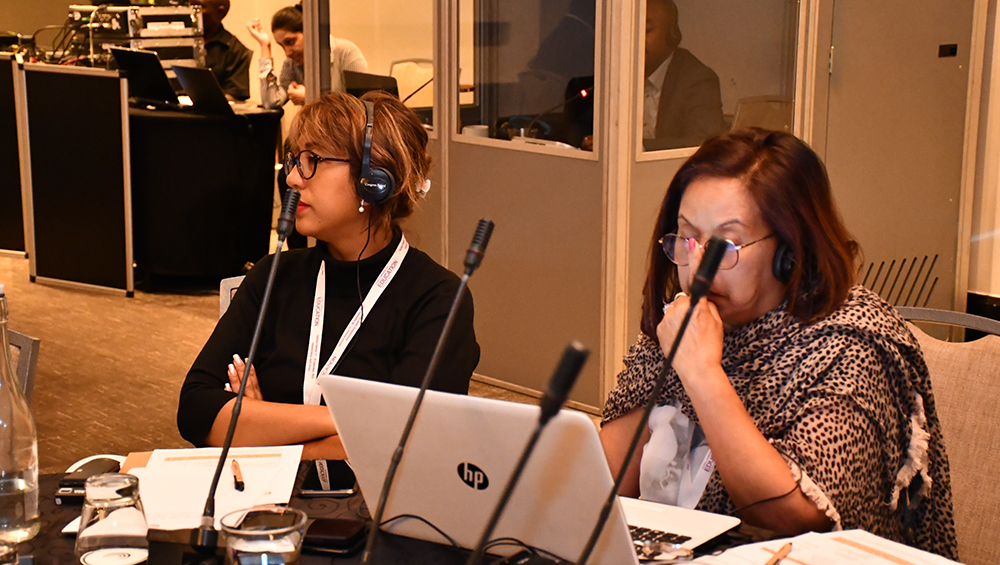Harnessing Education Technology Research Seminar Lessons and Best Practices from Madagascar

It has been almost a week since GCE convened project partners from Burundi, Democratic Republic of Congo, Madagascar, Malawi, Namibia, Rwanda, and Zambia for a two-day seminar on Harnessing Education Technology as a Response to COVID-19 in Johannesburg, South Africa, from 27 to 28 September 2022.
GCE is happy to share with you the following reflective lessons from Madagascar:
Lessons and best practices from Madagascar
Presented by: Huguette Rakotoarivony, Coalition de Madagascar CONAMEPT.
During the COVID-19 pandemic, Madagascar used a paper-based approach to complement digital outreach to children during school closures. Evidence shows that in addition to paper-based take-home schooling packages, Madagascar was able to build on its past experience with radio-based instruction to launch further radio programming at the start of the pandemic (Dreesen et al., 2020). It also continued to receive further support from the Education Development Centre (EDC) and UNESCO to continue enhancing its radio-based content (EDC, 2021; UNESCO, 2020b). In addition, the government of Madagascar delivered maths education to primary school students via television and through video uploads to YouTube with support from the Japan International Cooperation Agency (JICA) and Madagascar's own Ministry of National Education and Technical and Vocational Education (MENETP) (Kazel, 2020).
Moreover, the edutainment programme spearheaded by MENETP (Kilasy Pour Tous) leveraged media outlets to ensure that educational content for school-aged children aired on TV and radio every morning (Kazel, 2020). These efforts via radio and television were purported to reach 600,000 children as at July 2020; additionally, 300,000 paper-based schooling packages were distributed by the same time (UNICEF Madagascar Country Office, 2020). UNICEF Madagascar reports that the pandemic affected the schooling of 7 million learners in the country, with approximately 13% of school children reached through radio, television and paper-based instructional materials. Orange Madagascar, a Telecommunications company, also offers zero-rated access to educational content, including Wikipedia and the Internet Archive, for its customers who purchased its “Be Connect” package through a programme titled “Je peux m'instruire en restant chez moi” (I can learn by staying at home) (Orange Madagascar, n.d.).
Notwithstanding these commendable interventions to ensure continuous learning in the midst of the pandemic, the intervention strategy was marred by some challenges such as:
- Having internet access for only 19.4% of the population, from a population of 28.06 million in January 2021 (5.45 million people) (Kemp, 2021);
- Radio has an access percentage of about 40% of the population, and for television, it is approximately 25% (InterNews, 2021);
- The majority of parents of students lack the means to provide their children with electronic devices (smartphones or computers) for online teaching, even less a television set or even a simple radio set for distance learning courses; and
- Teachers in charge of distance education have neither appropriate training nor adequate materials to provide quality distance education.
The coalitions’ intervention and results
Through the GCE’s Harnessing EduTech Project funded by GIZ, Coalition de Madagascar CONAMEPT implemented a research project entitled “Amplification of the voice of society civil towards the promotion of learning digital in times of health and social crisis in the Analamanga region”.
The study sought to identify challenges and opportunities in promoting digital learning at all levels through the promotion of technological capacity building for families and teachers to access educational technologies (EduTech)/ digital learning in times of emergencies and pandemics similar to COVID-19. The information obtained through the research study was used to engage with the Ministry of Education and other education stakeholders in Madagascar. These included;
- The government and other private players facilitating the construction and development of infrastructure for internet access, particularly in homes and schools;
- The government coming up with creative ways to procure and distribute technological gadgets among the majority of parents and students with electronic devices (smartphones or computers) for online teaching, television sets or even a simple radio set for distance learning courses; and
- Equipping teachers in charge of distance education with appropriate training and adequate materials to provide quality distance education.
Following the interventions by the Coalition de Madagascar CONAMEPT, internal consultations are ongoing to back-up Education Guideline Sharing Sessions with the leaders of member organizations, choice and validation of priority actions with the areas of intervention. In addition, the coalition conducted exchanges with the office of the PNPSE (GLPE) of the Proposal Exchange with CISCO and ZAPReformulation of the technical file, with the preparation of the budget after obtaining the primary data from the president of ZAP and two private operators.


